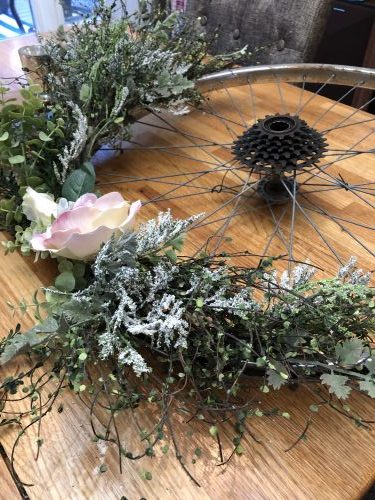In this issue:
Sometimes friends pile a lot of shoulds on each other. Have you caught yourself telling someone what they ought to do, rather than listening? Are you tired of being the one that others heap their shoulds on? Learn tips for how to learn to be a friend rather than a fixer, and how to reply when someone tries to fix you. Also discover a small group resource that you and your friends might want to consider.
Podcast
Inspired Life: Burdened by Should
Have you ever noticed that when someone starts to tell you about something that happened to them, you start to think of responses and solutions?
Many times, those start with should.
I have caught myself doing this so often. I say things such as:
- You should try….
- You should tell him…
- You should be happy that…
Sometimes we have a genuine solution, but that isn’t what the friend is looking for right then. They just want a listening ear.
I was working on a writing project recently when I noticed that should is two letters away from the word shoulder. When we tell someone what we think they should do, we ask them to shoulder a burden. It might be that we pile guilt on. Or we pile on responsibility, when someone is already feeling a heavy load.
What can we do when we want to tell someone what they should do? I’m not saying you SHOULD do this, but here are five tips:
1) Instead of telling them what they should do, ask a question.
What solutions have you tried?
What do you think your next step will be?
How do you feel about that?
Do you see a possible resolution?
2) Clarify and reflect what you heard them say.
So what I hear you saying is that you’re frustrated because…
I think I understand that you’re saying…
3) Stop the story in your head that starts to think of a one-up story. “You think that’s bad…let me tell you about MY situation.”
This includes not giving advice that says, “When that happened to me I….You should try that too.”
4) Avoid the cousin to should – shouldn’t.
“You shouldn’t have done that.”
5) Ask for permission before sharing advice.
“Would you like my input with advice, or do you prefer a listening ear?”
Our Goal Is Listening
Sometimes we like to fix other people. We want to provide perfect, happy solutions that make their life better. But instead, we pile on guilt or a feeling of inadequacy. Instead, we can practice listening to others.
I have caught myself offering “should” several times this week. It might not always look the same, but here are some words that imply the same thing:
- Here’s what I would do…
- Why haven’t you….?
- Just tell them…
Instead of telling a friend “you should pray about this,” ask if they would like you to pray with them right there. “May I pray with you about this right now?”
With a little practice, we can learn how to be a wonderful listening friend.
Life, Repurposed: When Others Heap on Shoulds
Years ago on my blog, I used to have a What Would You Do With This Wednesday feature where I put up a vintage item and asked people what they would do with it.
Not too long ago on my Trash to Treasure Decorating Facebook page, I asked what my followers would do with an old bike tire rim. I had some fun answers and even some photos. 
I turned it into a wreath by putting flowers around the side, and I hung it above the bed. It was a simple project that I was able to do all with supplies I had around the house. Even the flowers were repurposed form another arrangement.
Asking a Friend, "What Would You Do?"
Sometimes we invite the invite the advice of other people. We ask them, “What would you do?”
When we ask for advice, we need to be prepared for some answers that will include “should.” It’s up to you to weed them out. If someone offers a “should” you might consider these responses, especially if that response frustrates you.
1) Assume the best and try to imagine that they didn’t intend to burden you with a heavy should.
2) Know the heart of the person offering the advice. If it’s a dear friend, it might be valuable advice worth considering.
3) Gently remind them that you weren’t looking for advice. Remind them you wanted empathy more.
4) Thank them graciously and move on.
5) Ask them clarifying questions. “Are you saying you think I need to…?”
Most of the time, we’re way better at telling others what they should do than receiving advice and applying it. Self-awareness will go a long way in learning an even more helpful way of comforting and counseling a friend who is going through a difficult time.
Listen this week for how many times you hear “should” or one of its cousins come from your lips.
Recommended Resources
As we learn and practice listening without offering advice, a small group is a great place to build that awareness of others. It's where we become self-aware as we make an effort to focus on others while we provide mutual support for each other.
I wrote this Bible study in 2018 for the SAMMYS ministry. It is titled Remade: A 10-week Bible Study on the Transforming Power of Jesus.
The book has a participant workbook and leader guide all in one. At each meeting, the leader uses the notes to teach for a portion and then the group breaks into smaller discussion groups to continue in the workbook.
From the book description: Broken doesn’t have to mean hopeless. Our brokenness is bondage when we don’t see any hope—like a chain and weights that go everywhere with us. But when we understand that Jesus came for broken people and came to set us free from every chain, then we begin to experience hope, even in our brokenness! This ten-week Bible study for women explores what it means to be remade and changed in such a way that we discover a way for all of our experiences—good or bad—to fit together into a work of art that doesn’t make sense at first, but has its own beauty just the same. The study covers the stories of ordinary broken people from the Bible—Paul, the woman at the well, Zacchaeus, Nicodemus and more. Participants will learn ten principles for being remade: redeemed, restart, repurposed, renewed, redesigned, renamed, reborn, refreshed, repentance, restored.
Features:
- Ten Bible study lessons for small groups.
- Each lesson begins with a group teaching time with notes provided for the leader that require a low amount of preparation.
- Women will break into discussion groups to engage with each other and apply the content to their everyday lives.
- Plus, every lesson includes optional solo work for each woman to complete at home.
Benefits:
- Discover how to experience the freedom of grace
- Learn and apply Bible truths•Grow spiritually in fellowship with others•Apply Scripture to everyday life to experience true change
- Encourage others on their spiritual journey
- Develop habits of personal time with God
- Start wherever you are, no matter your level of Bible knowledge.
Strength Among Many Ministry, better known as SAMMYS, invites women to refuel their heart and soul with genuine friendships and scriptural teachings. Learn more and discover how to start your own local chapter at www.sammysinc.org.
Find Remade: A 10-week Bible Study on the Transforming Power of Jesus on Amazon.
[Affiliate links included for convenience in ordering]
When you send a direct message on Facebook, Twitter, or Instagram, tell me something you’ve noticed from my bio that we have in common. I love to get to know new people through those private chats!
Have you reviewed the podcast yet? I’d love if you would leave a review on iTunes or Google plus. Be sure to follow so you can get each episode on your podcasts when it is released.
Or here on my website you can sign up to get an email every time an episode comes out. Subscribe to Monthly Blogzine
(Please note: books posted here on my blog are purely because I want to share them. Sometimes I receive free copies for review, and other times I purchase the books. Some I get from the library. Either way, any endorsement I offer here on the blog is simply because I want to talk about the book. ) *This post contains affiliate links, meaning, at no additional cost to you, if you click through and make a purchase, I may receive a commission. I sell my ebook via Amazon but I’m also a part of their “Associates” (i.e. affiliate) program which pays a commission on books and any other Amazon products people purchase via my links.
Michelle Rayburn is the author of The Repurposed and Upcycled Life: When God Turns Trash to Treasure, as well as a small group Bible study to accompany the book. Learn more about these and her other books here. A sample chapter of the book and Bible study are available for free download.
Subscribe and receive an email notice each time a new blog is posted.
You can also subscribe on iTunes or on YouTube
All blog content copyright MichelleRayburn.com
This post contains affiliate links, meaning, at no additional cost to you, if you click through and make a purchase, I may receive a commission. I sell my ebook via Amazon but I’m also a part of their “Associates” (i.e. affiliate) program which pays a commission on books and any other Amazon products people purchase via my links.


